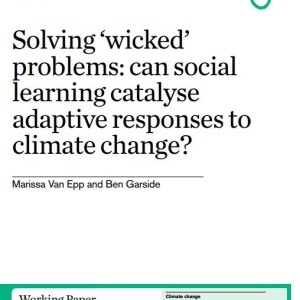
This report from IIED looks at when and how social learning-oriented approaches contribute to better and more sustainable development outcomes, focusing specifically on food security and climate change.
IIED has conducted research with five different initiatives to pilot a framework that helps users track process and outcomes in four key aspects of a social learning approach: engagement, iterative learning, building capacity, and challenging institutions. Their findings confirm their theory: that social learning-orientated approaches with strong process leads to collective learning and positive change; and where the four key aspects (engagement, iterative learning, building capacity, and challenging institution) interlink, the results are stronger still. Conversely, outcomes were weak where there is little or no process.
The 5 initiatives that participated in this research are:
- The 'Potato Park' in the Peruvian Andes
- The 'Bolsa Floresta Programme' in the Brazilian Amazon
- The African Climate Change Resilience Alliance (ACCRA) in Uganda
- The Policy Action for Climate Change Adaptation (PACCA) in East Africa, and
- The Collaborative Adaptation Research Initiative for Africa and Asia (CARIAA)
Despite the small sample size, the report concludes that these findings on how social learning approaches can help solve complex challenges and improve development outcomes are encouraging. Future work should continue building evidence and understanding on using flexible process-oriented approaches such as social learning to mobilise action while improving outcomes. One way of doing this is by working with those willing to experiment.
For more material, take a look at some of these IIED reports and texts on the topic:
- It's the process, stupid (blog) à https://www.iied.org/its-process-stupid
- Solving ‘wicked’ problems: can social learning catalyse adaptive responses to climate change? à http://pubs.iied.org/17390IIED
- Solving ‘wicked’ problems: can social learning catalyse adaptive responses to climate change? A compendium of case studies à http://pubs.iied.org/17398IIED
If you have any questions about the research you can direct them to Ben Garside, senior researcher in IIED's Shaping Sustainable Markets research group.
Read the full report here.







Post a new comment »